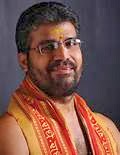The Teaching and the Guru Sishya Parampara in Bharatham :
Swami Dayananda Saraswati
The Vedas have a vision or a 'view' of life and also a 'way' of life. That you are the whole is the view of the Vedas. The way of life means a life style with right attitudes and values which help you discover the vision that you are the whole.
There is a method of teaching, a method of communication, by which the vision of the whole can be imparted to the other. We have a tradition that begins from Lord Siva and comes down to us through the Rishis. The tradition has always been the same. It has not undergone any change; it cannot undergo a change because it deals with the whole. This certainly does not apply to the knowledge of the parts. For example, the knowledge of physics in the Vedas is definitely wanting. But that is so because physics deals with details. Physics was not the subject of the Rishis. You can always defer about the details in the creation and that is so even now. What is considered as right at one time may not be considered so at another. And so the knowledge of the whole alone is the knowledge that can be handed down intact without the need for any amendment. Thus we have a parampara or a tradition.
Mystics do not create mystics-because they are mystics. A mystic cannot make another one equally an eloquent mystic. If he can, then there is a means of communication and therefore there is nothing mystic about it. Then there is a teacher. Mystics have no tradition whereas when teaching is involved, there is communication. There can be a tradition-a teacher, a student and his or her student; Guru-Sishya parampara. Then the flow is possible.
In this world there is nothing more sacred, more purifying than knowledge. This knowledge, Arsha Vidya is like a river that flows from the teacher to the student and to his or her student and thus it goes down. And knowledge being what it is, it is always true to the object. There cannot be a second version about knowledge.
The word guru can be used for anyone who imparts us knowledge; be it the knowledge of music, dancing, language or any other subject.
Guru means the one who removes ignorance. But nobody removes ignorance completely in any subject; everyone removes ignorance only to a certain extent. In fact, in all disciplines of empirical knowledge, we find that the more we learn, the more we come to discover what we do not know. So none of the teachers of empirical knowledge can be called guru in a real sense because none of them removes ignorance totally. Hence if any one can remove ignorance totally, it is only the one who teaches the whole, because the ignorance of the whole is the one single ignorance-there are no parts in the whole. Therefore only one person can be called guru in the real sense and that is the one who removes the ignorance of the whole and only one means of knowledge can be called the valid means of knowledge and that is the means that becomes instrumental in giving rise to the knowledge of the whole. It does not stand contradiction; it cannot be falsified. Once known, it is known for good.
To remove the ignorance of the whole is the job of the guru. The first guru is the lord, the creator. It all starts with the Lord. We know the parampara only upto the Rishis and then we simply connect it to Lord Sadasiva or to Lord Dakshinamurti. The knowledge is first revealed to the Rishis and from them it flows to us. Therefore this Vidya is called Arsha Vidya, the vision of the Rishis.
Arsha Vidya, the vision of the Rishis is a beautiful vision. It cannot be bettered by anybody because the Rishis have the last word about you. Others can say you are a part of the total, you are little, you are mortal, etc. But the Rishis say that you are the whole. They have the last word about you and they say that you are the last word in the creation! And so this vision Arsha Vidya can never be bettered. It is also not available for any kind of an opinion and so it cannot be falsified. The whole is not subject to time et. and hence it does not come under any kind of contention. And that is why it can be handed down by a teacher to a student in its entirety. This is the only knowledge which qualifies to be called knowledge because it cannot be falsified, it cannot be improved upon, it cannot be amended. Everyone must acquire this knowledge because there is no choice in becoming the whole.




Comments